PLEASE NOTE:
While the following article relates to your Google search, the services and methods at Goodwin Hypnosis may differ from those mentioned below. Since 2007, we have helped thousands of clients to overcome emotional and behavioral challenges when all else had failed. According to many of them (and their referring healthcare providers), our methods are faster than talk therapy, easier than willpower, and safer than medication. If you’re ready to resolve your issues, skip the article and visit the rest of our website, where you can learn about our unique approach, watch client testimonial videos, and discover how working with us one-on-one could be the solution you’ve been searching for.
Introduction
Hypnosis has long been shrouded in mystery and skepticism, but recent research is shedding light on its profound potential for personal transformation, particularly in the realm of weight loss. By delving into the subconscious mind, hypnosis taps into deeply rooted beliefs and behaviors that conventional methods often fail to address. This article explores the science behind hypnosis, its mechanisms, and the various techniques that can aid in weight loss.
It also highlights the benefits of integrating hypnosis into a comprehensive weight management plan and offers guidance on finding a board certified hypnotist. Through understanding and harnessing the power of hypnosis, individuals can embark on a supportive and effective journey towards achieving their weight loss goals.
Understanding Hypnosis and Its Mechanisms
Hypnosis is a trance-like state where focused attention and heightened suggestibility come together, often accompanied by deep relaxation. This state allows individuals to access their subconscious mind, where deeply rooted beliefs and behaviors reside. By tapping into this part of the mind, guided relaxation can facilitate significant changes in thought patterns and emotional responses, making it a powerful tool for personal transformation. Experts concur that this technique allows a distinct form of concentrated focus that makes individuals receptive to suggestion. As Dr. Afik Faerman from Stanford University states, “Our brains soak up information from the environment and combine it with our prior beliefs and experiences to form a conscious experience of the moment.” Clinical suggestion can benefit most people to some degree, though responsiveness varies. Gary Elkins, PhD, from Baylor University highlights, “People in the higher range may respond more quickly, but almost anyone can be a candidate for clinical hypnosis.” Even those not highly hypnotizable can achieve results with more sessions or practice. Hypnosis has also been shown to be effective in treating conditions like chronic pain, menopausal hot flashes, and even as a cost-effective analgesic.
The Science Behind Hypnosis for Weight Loss
Research has indicated that trance-like states can significantly alter how individuals perceive food, exercise, and body image. Studies suggest that this process can effectively modify cravings, promote healthier choices, and reduce emotional eating. Neuroimaging studies suggest that trance state stimulates particular areas of the brain linked to motivation and self-regulation, promoting an optimistic attitude towards reducing body mass. For instance, a research involving individuals who adhered to a structured fitness regimen and a calorie-restricted diet showed that integrating hypnotic suggestions with these lifestyle modifications resulted in significant enhancements in body reduction and self-regulation skills. This evidence-based method emphasizes the potential of suggestion in supporting long-term weight loss goals. In another study, Gary Elkins, PhD, noted that while responsiveness to hypnosis varies, most people can benefit from it to some degree, with higher hypnotizability potentially yielding quicker results. This aligns with findings from neuroimaging studies, which highlight increased communication between brain regions like the dorsolateral prefrontal cortex and the anterior cingulate cortex in highly hypnotizable individuals, enhancing their ability to make healthier decisions.
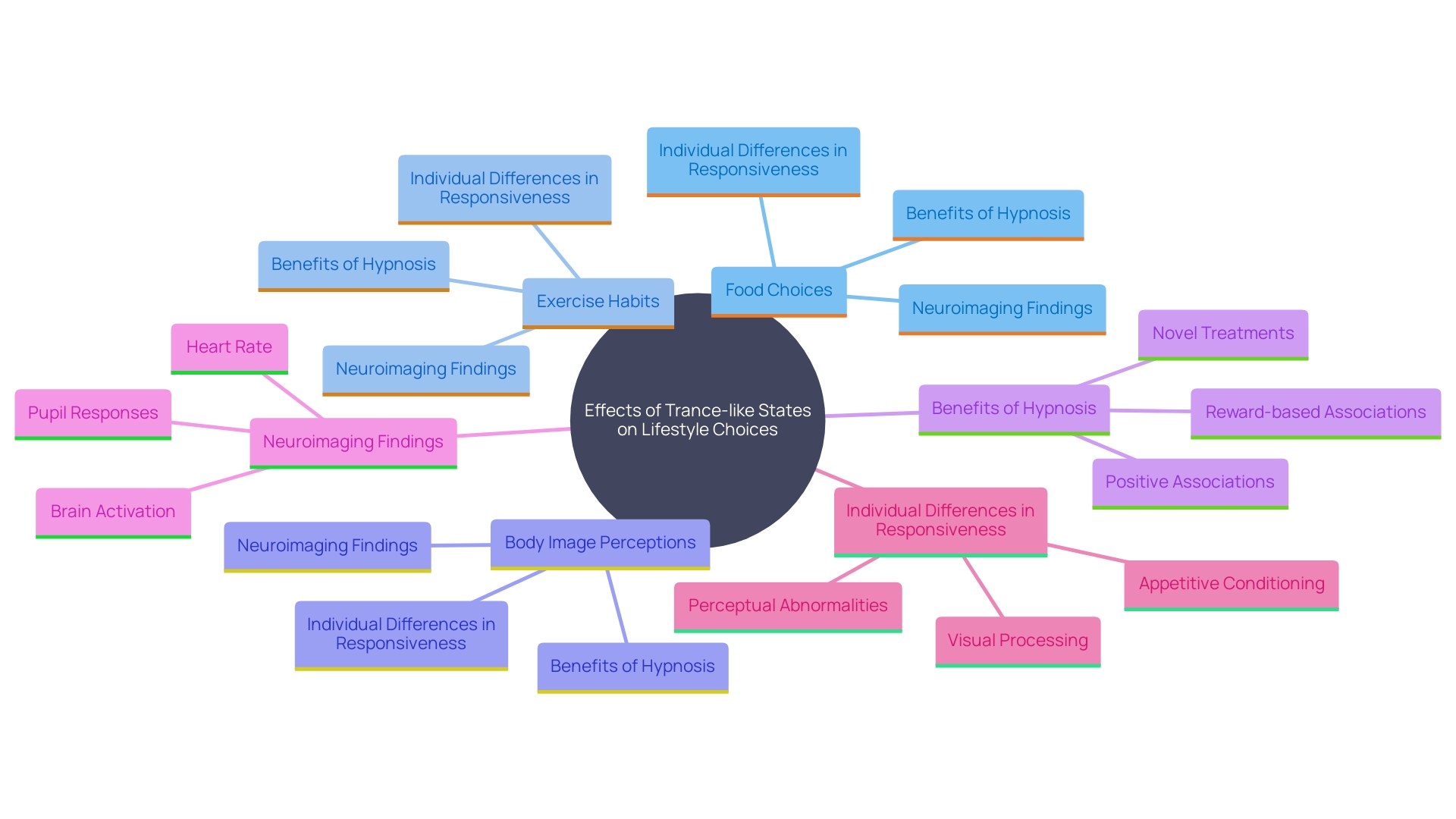
Benefits of Hypnosis for Weight Loss
Hypnosis provides various advantages for individuals aiming to shed pounds. Beyond enhancing motivation, it can help reduce anxiety around food and break the cycle of emotional eating, a common hurdle for many. As stated by Gary Elkins, PhD, a faculty member of psychology and neuroscience at Baylor University, "almost anyone can be a candidate for clinical suggestion," although those with greater susceptibility to suggestion might observe faster outcomes. This adaptability makes suggestion a versatile instrument in managing body mass.
Moreover, this technique promotes a positive body image and self-acceptance, which are essential for lasting lifestyle changes. A study highlighted in the Annals of Internal Medicine found that individuals were more likely to reduce their mass when their doctors presented treatment options in an optimistic tone, emphasizing the opportunity for improvement rather than focusing on negative consequences.
Moreover, suggestion techniques can speed up the reduction of mass by strengthening beneficial routines. Participants in various studies have shown significant progress when combining suggestion techniques with behavioral strategies like goal setting and self-monitoring. For instance, the Look AHEAD trial demonstrated that lifestyle interventions, including increased physical activity and caloric restriction, were effective over a long period. These findings indicate that hypnosis, when combined with other evidence-based methods for reducing body mass, can provide a thorough strategy for attaining and sustaining a healthier size.
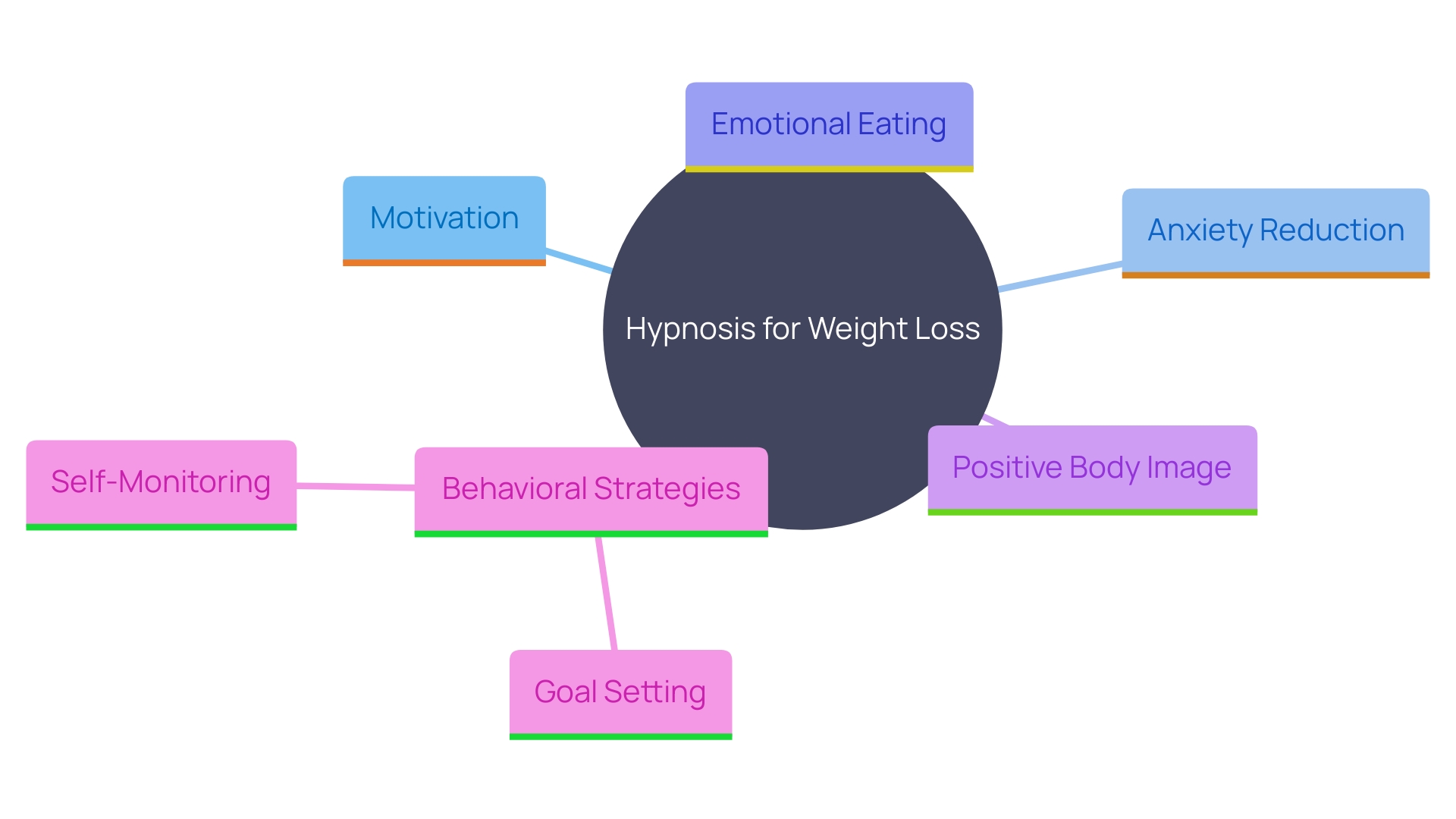
Types of Hypnotherapy for Weight Loss
Hypnosis provides for various methods for reducing body mass, each customized to address personal requirements. One common method is suggestion therapy, where positive affirmations are embedded into the subconscious mind, promoting healthier eating habits and increased motivation for reducing body mass. This technique can be particularly effective, as studies have shown that even a single session of hypnosis can lead to marked improvements in conditions like ulcerative colitis by reducing inflammatory markers.
Another effective approach is regression therapy, which delves into past experiences to uncover and resolve emotional triggers that contribute to unhealthy eating patterns. This method utilizes the strong link between our emotional conditions and digestive well-being, often called the 'brain-gut axis.' Grasping and tackling these profound issues can result in more sustainable results regarding body mass.
Visualization methods are also commonly employed in hypnotherapy for reducing body mass. Clients are guided to vividly envision their ideal physique and the positive emotions linked to attaining it. This method not only boosts motivation but also engages the brain in a way that supports behavioral change. Suggestion provides distinct benefits compared to mindfulness techniques by allowing people to proactively implement changes instead of simply acknowledging their existing condition.
The effectiveness of these hypnotherapy techniques is supported by a growing body of research. For instance, Gary Elkins, PhD, has shown that while the degree of responsiveness to hypnotherapy can vary, most people can benefit from it to some extent. This flexibility makes hypnotherapy a practical choice for a diverse group of people looking to shed pounds.
What really matters is to change the thoughts and feelings that influence those behaviors that contribute to weight gain or weight loss. Constant stress or anxiety can trigger unhealthy emotional eating, which can make it difficult to maintain a healthy weight. Unresolved emotional trauma, including that caused by sexual abuse, is a common root cause of obesity.
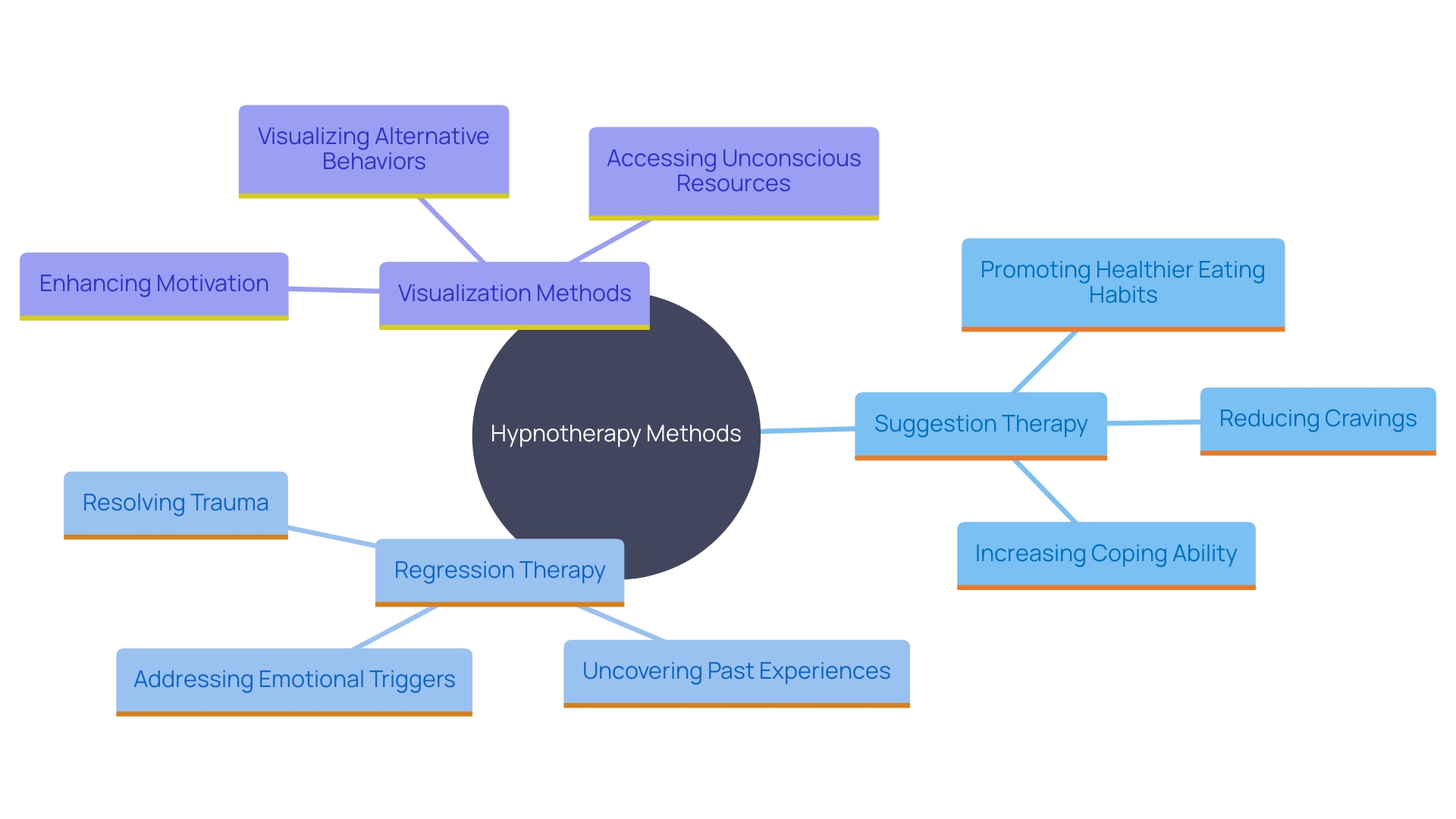
Research Findings on Hypnosis for Weight Loss
Many research projects highlight the efficacy of suggestion in losing pounds. One significant study revealed that individuals who underwent hypnosis lost considerably more mass compared to those who only received traditional weight-loss advice. This corresponds with Dr. Gary Elkins' findings that even those with lower hypnotizability can benefit from clinical suggestion, though they may require more sessions or practice. Furthermore, observational studies indicate that individuals are more inclined to engage in and achieve success in reduction programs when their physicians present treatments in a favorable light, considering them as chances instead of stressing adverse outcomes. The lasting advantages of including suggestion techniques are also significant, as many participants sustain their reduction in body mass over time, aided by behavioral strategies focusing on nutritious diets and enhanced physical activity.
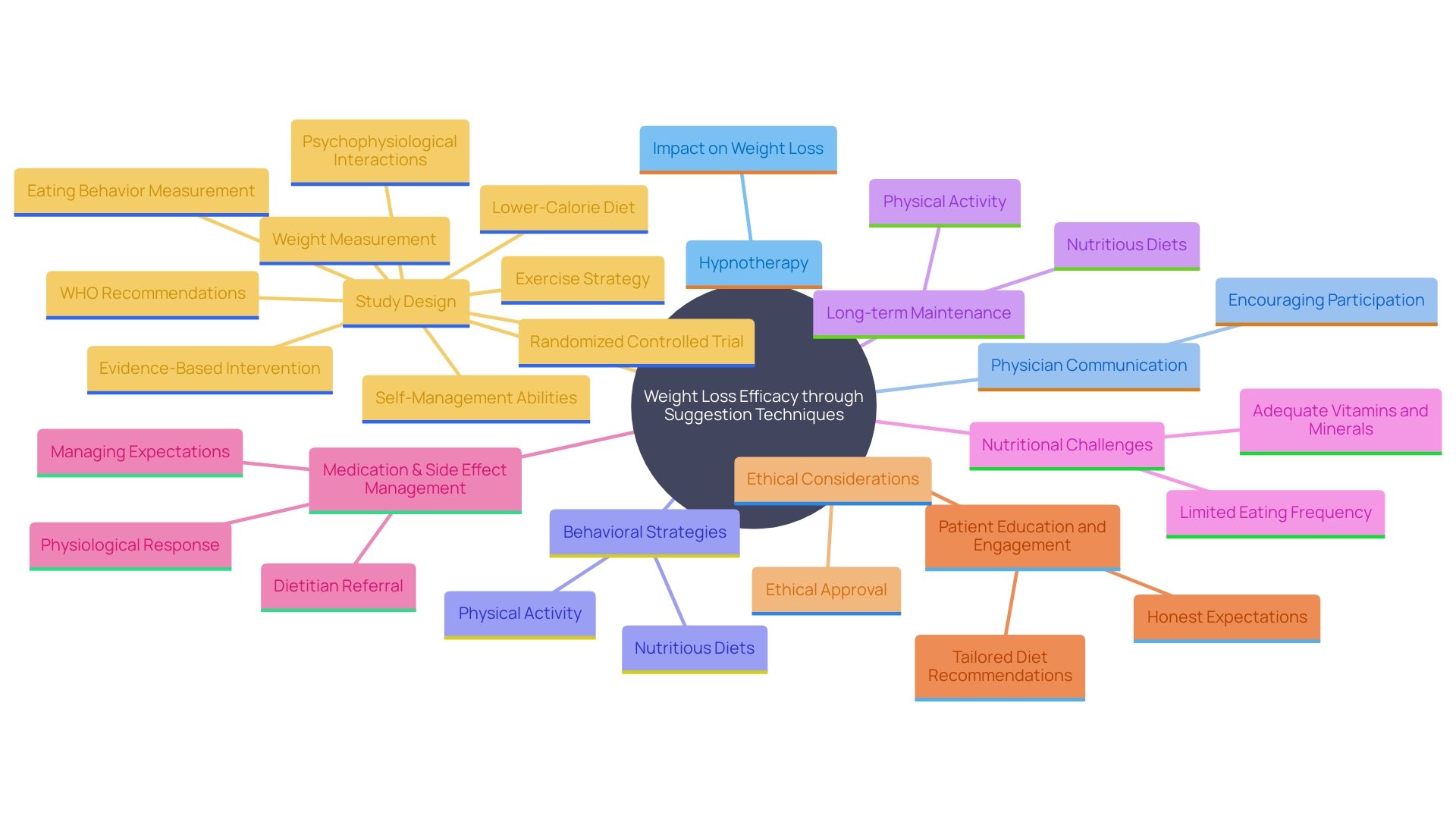
Incorporating Hypnosis into a Weight Loss Plan
Incorporating hypnosis into a thorough program for shedding excess pounds that includes dietary modifications and exercise can offer a well-rounded method to attaining lasting success. Addressing emotional and psychological factors is crucial, as these elements often play a significant role in managing body mass. Research indicates that patients who receive encouraging and supportive counseling are more likely to join programs for reducing body mass and attain their objectives.
Working with a professional hypnotist can help you create a personalized plan that meets your individual needs and goals. For instance, recent research suggests that self-hypnosis training can be beneficial in managing chronic conditions, which highlights the potential of hypnosis in reducing body mass. Furthermore, long-term success in managing body mass is linked to low levels of depression and disinhibition, emphasizing the significance of mental well-being in the process.
As pointed out by Allison Young, MD, a psychiatrist from New York City, "Research indicates a bidirectional connection between mental well-being and body mass." This relationship indicates that enhancing mental well-being can greatly improve the efficacy of slimming endeavors. In clinical trials, participants who combined medication with lifestyle changes, including mental health support, experienced significant reductions in mass, reinforcing the value of a comprehensive and integrated approach.
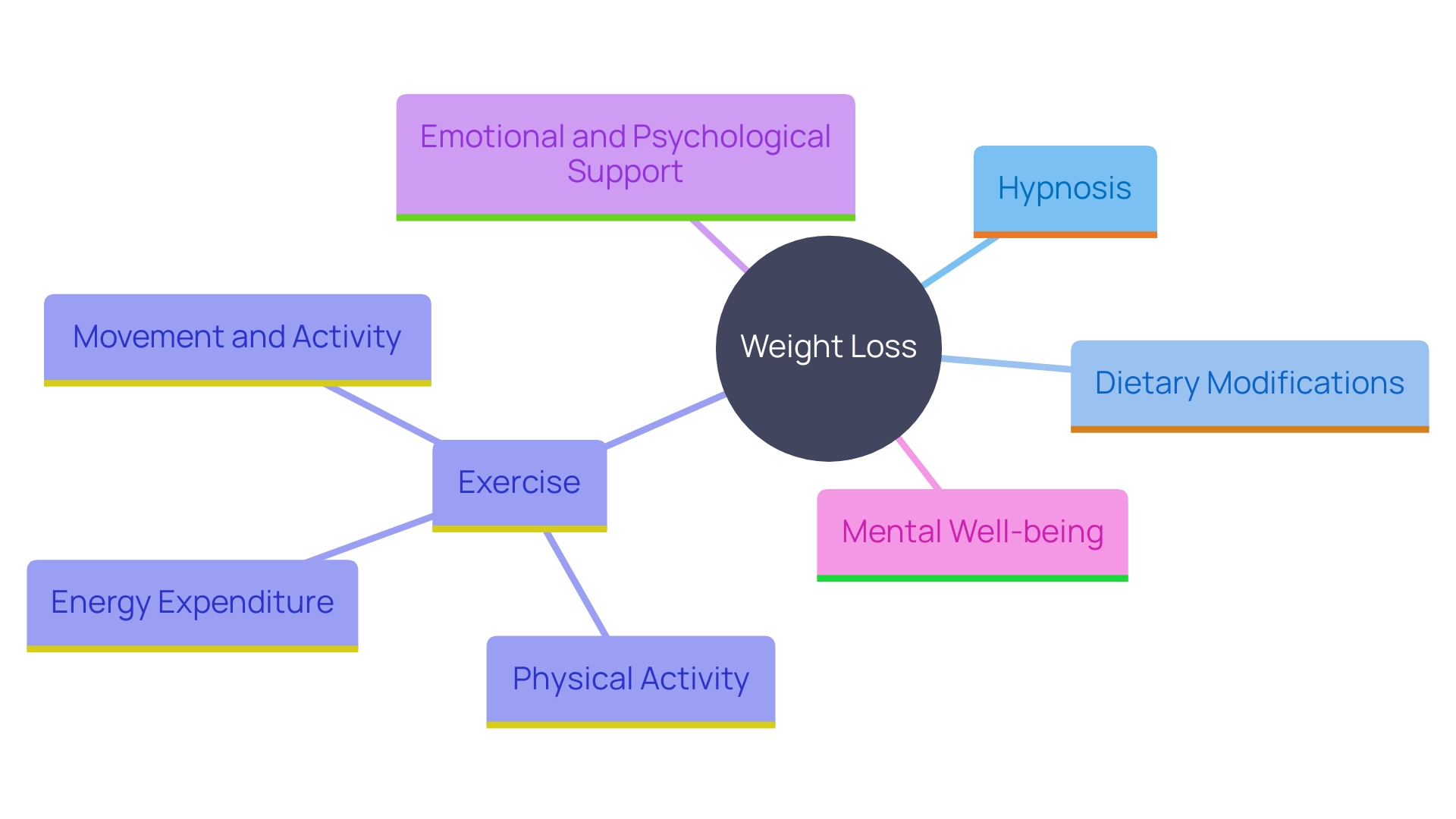
Finding a Certified Hypnotherapist for Weight Loss
Selecting the appropriate practitioner is a crucial step for a successful journey towards improving eating habits and reducing body mass. It's crucial to find a hypnotist who can clearly explain their methods and build a strong rapport with you. This professional should create a safe and supportive environment, making you feel comfortable and understood.
Albina Angan, who successfully lost 50 lbs, underscores the significance of finding the right support and guidance. Her journey demonstrates that when hypnotherapy is combined with proper diet and exercise, especially for conditions like PCOS, the results can be transformative.
Michael Forman, PhD, DAOM, a practitioner of functional medicine and clinial nutritionist said, "The professionals at Goodwin Hypnosis totally exceeded my expectations both in terms of the process and its efficacy. They are thorough and ingenious about identifying the heart of the matter and get right to the point of resolving it. This is a no-nonsense, practical therapy which I highly recommend to anyone in need of a breakthrough with a stubborn problem or issue."
Todd and Gina Goodwin are board certified hypnotists with many years of experience working with a variety of issues related to eating habits and weight. Most importantly, they address the underlying thoughts and emotions that trigger unhealthy behaviors. The effectiveness of hypnotherapy can be greatly enhanced by ensuring that your chosen hypnotherapist meets these criteria, providing a foundation for lasting change.
Conclusion
Hypnosis presents a remarkable avenue for personal transformation, particularly in the context of weight loss. By engaging the subconscious mind, hypnosis enables individuals to confront and reshape deeply ingrained beliefs and behaviors surrounding food, exercise, and body image. The mechanisms of hypnosis, including focused attention and heightened suggestibility, facilitate significant changes that conventional methods may overlook.
Research consistently highlights the efficacy of hypnotherapy in promoting healthier choices, reducing emotional eating, and enhancing motivation. Various hypnotherapy techniques, such as suggestion therapy, regression therapy, and visualization, cater to individual needs, making hypnosis a versatile and adaptable tool for weight management. The integration of hypnosis within a comprehensive weight loss plan—combined with dietary changes and physical activity—fosters a holistic approach that addresses both psychological and emotional factors contributing to weight challenges.
Finding an experienced, board certified hypnotist is crucial for maximizing the benefits of hypnotherapy. A supportive and understanding professional can tailor strategies to individual goals, providing a nurturing environment that enhances the transformative potential of this practice. Ultimately, the journey toward weight loss can be significantly enriched through the empowering effects of hypnosis, paving the way for lasting change and improved mental well-being.
Embracing this innovative approach may lead to a healthier, more fulfilling life.




